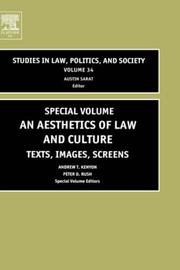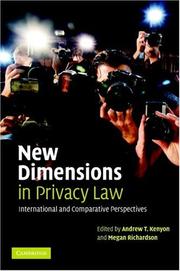| Listing 1 - 10 of 11 | << page >> |
Sort by
|

ISBN: 0762311517 1849503044 9786610631452 1280631457 0080458009 9781849503044 9780080458007 9780762311514 9781280631450 661063145X Year: 2009 Publisher: Bingley Emerald Group Publishing Limited
Abstract | Keywords | Export | Availability | Bookmark
 Loading...
Loading...Choose an application
- Reference Manager
- EndNote
- RefWorks (Direct export to RefWorks)
This special volume of "Studies in Law, Politics, and Society - The Aesthetics of Law and Culture: Texts, Images, Screens" - examines practices of representation and their relation to juridical and cultural formations. The chapters range across the media of speech and writing, word and image, legislation and judgment, literature, cinema and photography. The contributions draw on disciplines including jurisprudence, literary criticism, philosophy, cinema studies, art and visual studies, cartography, historiography and medicine. They are ordered according to four prominent themes in contemporary, theoretically informed critical scholarship: Crime Scenes: Sexuality and Representation; Sites Unsaid: Testimony, Image, Genre; (Post) Colonial Appropriations; and Screen Culture: Sovereignty, Cinema and Law.
Law and aesthetics --- Culture and law --- Law and culture --- Law --- Aesthetics and law --- Aesthetics --- Law & society. --- Social Science --- Sociology --- General.
Book
ISBN: 1316586901 1316587088 1316587266 1316587444 1316588165 1316402460 110712364X 1107559189 1316585824 9781316402467 9781316588161 9781316587447 9781107123649 9781107559189 Year: 2016 Publisher: Cambridge, United Kingdom
Abstract | Keywords | Export | Availability | Bookmark
 Loading...
Loading...Choose an application
- Reference Manager
- EndNote
- RefWorks (Direct export to RefWorks)
Defamation and privacy are now two central issues in media law. While defamation law has long posed concerns for media publications, the emergence of privacy as a legal challenge has been relatively recent in many common law jurisdictions outside the US. A number of jurisdictions have seen recent defamation and privacy law reforms, which have often drawn on, or reacted against, developments elsewhere. This timely book examines topical issues in defamation and privacy law focused on media, journalism and contemporary communication. Aimed at a wide legal audience, it brings together leading and emerging analysts of media law to address current and proposed reforms and the impact of changes in communication environments, and to re-examine basic principles such as harm and free speech. This book will be of interest to all those working on commonwealth or US law, as well as comparative scholars from wider jurisdictions.
Freedom of expression --- Privacy --- Libel and slander --- Calumny --- Defamation --- Slander --- Torts --- Social psychology --- Secrecy --- Solitude --- Expression, Freedom of --- Free expression --- Liberty of expression --- Civil rights --- Law and legislation
Book
ISBN: 1108645097 9781108645096 9781108486163 9781108731898 1108786022 110878805X 1108486169 1108731899 Year: 2021 Publisher: Cambridge, United Kingdom ; New York, NY Cambridge University Press
Abstract | Keywords | Export | Availability | Bookmark
 Loading...
Loading...Choose an application
- Reference Manager
- EndNote
- RefWorks (Direct export to RefWorks)
Free speech has positive dimensions of enablement and negative dimensions of non-restraint, both of which require protection for democracy to have substantial communicative legitimacy. In Democracy of Expression, Andrew Kenyon explores this need for sustained plural public speech linked with positive communicative freedom. Drawing on sources from media studies, human rights, political theory, free speech theory and case law, Kenyon shows how positive dimensions of free speech could be imagined and pursued. While recognising that democratic governments face challenges of public communication and free speech that cannot be easily solved, Kenyon argues that understanding the nature of these challenges (including the value of positive free speech) at least makes possible a democracy of expression in which society has a voice, formulates judgments, and makes effective claims of government. In this groundbreaking work, Kenyon not only reframes how we conceptualize free speech, but also provides a roadmap for reform.
Freedom of speech. --- Freedom of expression. --- Freedom of speech --- Freedom of expression --- Civil rights --- Expression, Freedom of --- Free expression --- Liberty of expression --- Free speech --- Liberty of speech --- Speech, Freedom of --- Assembly, Right of --- Freedom of information --- Intellectual freedom --- Law and legislation --- Liberté d'expression. --- Liberté d'expression --- Droits civils et politiques --- LAW / Constitutional --- Human rights --- Mass communications --- Germany --- France --- Liberté d'expression. --- Liberté d'expression

ISBN: 1844720217 Year: 2006 Publisher: London : UCL press,
Abstract | Keywords | Export | Availability | Bookmark
 Loading...
Loading...Choose an application
- Reference Manager
- EndNote
- RefWorks (Direct export to RefWorks)

ISBN: 9780521187657 0521187656 9780521860741 0521860741 9780511494208 1107167760 0511257023 051125752X 0511324413 0511494203 1280709782 0511255977 051125654X 9780511257025 9780511257520 9780511256547 9786610709786 6610709785 9781107167766 9781280709784 9780511255977 9780511324413 Year: 2006 Publisher: Cambridge Cambridge University Press
Abstract | Keywords | Export | Availability | Bookmark
 Loading...
Loading...Choose an application
- Reference Manager
- EndNote
- RefWorks (Direct export to RefWorks)
The challenges faced by privacy laws in changing technological, commercial and social environments are considered in this broad-ranging 2006 examination of privacy law. The book encompasses three overlapping areas of analysis: privacy protection under the general law; legislative measures for data protection in digital communications networks; and the influence of transnational agreements and other pressures toward harmonised privacy standards. Leading, internationally recognised authors discuss developments across these three areas in the UK, Europe, the US, APEC (Asia-Pacific Economic Cooperation), Australia and New Zealand. Chapters draw on doctrinal and historical analysis of case law, theoretical approaches to both freedom of speech and privacy, and the interaction of law and communications technologies in order to examine present and future challenges to law's engagement with privacy.
Privacy, Right of --- Data protection --- Conflict of laws --- Droit à la vie privée --- Protection de l'information (Informatique) --- Droit à la vie privée (Droit international privé) --- Law and legislation --- Droit --- Privacy, Right of. --- Law and legislation. --- Law --- General and Others --- Data protection - Law and legislation --- Conflict of laws - Privacy, Right of --- Royaume-Uni --- Australie --- Nouvelle-Zélande --- France --- Allemagne --- Habeas data --- Invasion of privacy --- Right of privacy --- Civil rights --- Libel and slander --- Personality (Law) --- Press law --- Computer crimes --- Confidential communications --- Right to be forgotten --- Secrecy
Book
ISBN: 1509908315 Year: 2020 Publisher: London : Bloomsbury Publishing Plc,
Abstract | Keywords | Export | Availability | Bookmark
 Loading...
Loading...Choose an application
- Reference Manager
- EndNote
- RefWorks (Direct export to RefWorks)
"Freedom of expression is generally analysed as a bare liberty that should not be constrained by state action. Underpinning rationales for freedom of speech very often imply, however, that the concept also has important positive aspects, and that to be truly 'democratic' the modern polity requires more than negative freedom. In contemporary conditions, this understanding of free speech raises matters such as media diversity or pluralism, the concept of voice and access to the public sphere, access to information, and the need to rethink the audience in relation to public speech. Whether securing positive free speech is a matter of politics or of law, a task for legislatures or for courts, is an open question. On one level, any programme of inculcating positive dimensions of free speech might be understood as inherently polycentric and hence political in character. Yet, a number of Northern European jurisdictions evince enhanced legal recognition for the principle. The aim of this collection of papers is to interrogate the rationales of positive free speech, to consider the political and juridical methods by which it has or may be more fully reflected in the modern state, and to consider the range of practical contexts in which its valorisation has or would have significant implications. The contributors are drawn from an array of European and international jurisdictions. They include academic lawyers, sociologists, and political scientists"--
Book
ISBN: 1139334417 1107230764 1139084607 1280394153 1139337858 9786613572073 1139340301 113934188X 1139336983 1139338722 9781139336987 9781139084604 9781280394157 9781139340304 9781139338721 1107017726 9781107017726 9781139340304 9781139334419 9781107230767 9781139337854 6613572071 Year: 2012 Publisher: Cambridge Cambridge University Press
Abstract | Keywords | Export | Availability | Bookmark
 Loading...
Loading...Choose an application
- Reference Manager
- EndNote
- RefWorks (Direct export to RefWorks)
Efforts to expand the scope of legal protection given to reputation and brands in the Asia Pacific region have led to considerable controversy. Written by a variety of experts, the essays in this book consider the developing law of reputation and brands in a fraught area.
Brand name products --- Reputation (Law) --- Libel and slander. --- Names, Personal --- Personality (Law) --- Calumny --- Defamation --- Libel and slander --- Slander --- Torts --- Evidence, Character --- Fama publica --- Character evidence --- Evidence (Law) --- Brand names --- Branded merchandise --- Merchandise, Branded --- Name brand products --- Business names --- Commercial products --- Branding (Marketing) --- Trademarks --- Law and legislation --- Law and legislation. --- Law --- E-books --- General and Others
Multi
ISBN: 9789187957369 9789187957376 Year: 2016 Publisher: Göteborg Nordicom
Abstract | Keywords | Export | Availability | Bookmark
 Loading...
Loading...Choose an application
- Reference Manager
- EndNote
- RefWorks (Direct export to RefWorks)
Book
ISBN: 9780935995107 Year: 2009 Publisher: Ithaca, N.Y. Cornell University Library
Abstract | Keywords | Export | Availability | Bookmark
 Loading...
Loading...Choose an application
- Reference Manager
- EndNote
- RefWorks (Direct export to RefWorks)
Archivistics --- Industrial and intellectual property --- Library automation --- Information user --- United States --- United States of America
Book
ISBN: 1108620590 1108750060 1108617670 1108485154 110871921X Year: 2020 Publisher: Cambridge : Cambridge University Press,
Abstract | Keywords | Export | Availability | Bookmark
 Loading...
Loading...Choose an application
- Reference Manager
- EndNote
- RefWorks (Direct export to RefWorks)
Using as a starting point the work of internationally-renowned Australian scholar Sam Ricketson, whose contributions to intellectual property (IP) law and practice have been extensive and richly diverse, this volume examines topical and fundamental issues from across IP law. With authors from the US, UK, Europe, Asia, Australia and New Zealand, the book is structured in four parts, which move across IP regimes, jurisdictions, disciplines and professions, addressing issues that include what exactly is protected by IP regimes; regime differences, overlaps and transplants; copyright authorship and artificial intelligence; internationalization of IP through public and private international law; IP intersections with historical and empirical research, human rights, privacy, personality and cultural identity; IP scholars and universities, and the influence of treatises and textbooks. This work should be read by anyone interested in understanding the central issues in the evolving field of IP law.
Intellectual property. --- Intellectual property --- IP (Intellectual property) --- Proprietary rights --- Rights, Proprietary --- Intangible property --- Law and legislation --- Ricketson, Sam. --- Ricketson, Sam
| Listing 1 - 10 of 11 | << page >> |
Sort by
|

 Search
Search Feedback
Feedback About UniCat
About UniCat  Help
Help News
News